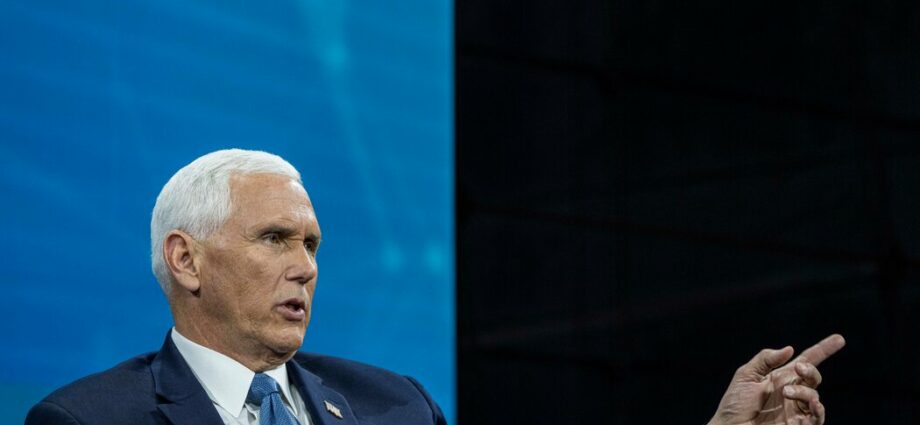The Justice Department has asked a federal judge to force former Vice President Mike Pence to testify fully in front of a grand jury investigating former President Donald J. Trump’s efforts to overturn the 2020 election, seeking to cut short any attempt by Mr. Trump to use executive privilege to shield Mr. Pence from answering questions, two people familiar with the matter said on Thursday.
The request — amounting to a pre-emptive motion to compel Mr. Pence’s testimony — came before the former vice president had even appeared in front of the grand jury, and before any privilege claims had actually been raised in court.
The sealed motion, filed in recent days in Federal District Court in Washington, is the latest step in a long-running behind-the-scenes struggle, first by the Justice Department and now by the office of the special counsel, Jack Smith, to cut through the various assertions of privilege that witnesses close to Mr. Trump have repeatedly raised in an effort to avoid answering questions.
The privilege disputes have been handled by Judge Beryl A. Howell, the chief federal judge in Washington, who oversees all of the district’s grand jury matters, which as a rule are conducted in secret. Judge Howell is expected to step down from her position next month and be replaced by another chief judge.
Last week, people close to Mr. Pence previewed his attempt to fight the grand jury subpoena by saying that the former vice president planned to argue that his role as the president of the Senate meant he was protected from legal scrutiny by the executive branch — including the Justice Department — under the Constitution’s “speech or debate” clause. That provision is intended to protect the separation of powers.
Understand the Events on Jan. 6
Such an approach would be a departure from the more traditional argument that a vice president’s interactions with a president would be subject to executive privilege, a power asserted by presidents to shield certain internal executive branch deliberations, especially confidential communications involving the president or among his top aides.
But the special counsel’s motion to compel Mr. Pence’s testimony — reported earlier by CBS News — did not address his expected arguments about the “speech or debate” clause, the two people familiar with the matter said. Rather, it focused on the issue of executive privilege and advanced the proactive argument that Mr. Pence should not be permitted to avoid answering questions by invoking it on Mr. Trump’s behalf, the people said.
How Times reporters cover politics. We rely on our journalists to be independent observers. So while Times staff members may vote, they are not allowed to endorse or campaign for candidates or political causes. This includes participating in marches or rallies in support of a movement or giving money to, or raising money for, any political candidate or election cause.
A spokesman for Mr. Pence declined to comment. Joshua Stueve, a spokesman for the special counsel’s office, also declined to comment.
In the fall, two former aides to Mr. Pence, Marc Short and Greg Jacob, asserted claims of both executive and attorney-client privilege in a bid to limit their own testimony in front of the grand jury investigating Mr. Trump’s role in overturning the election. The Justice Department filed a sealed motion at the time seeking to compel their testimony, and both men ultimately answered questions.
Not long after, Pat A. Cipollone and Patrick F. Philbin, the two top lawyers in Mr. Trump’s White House, tried a similar gambit. Again, the Justice Department prevailed, at least in part, and both men were made to answer questions in front of the grand jury.
Witnesses close to Mr. Trump have also raised claims of privilege in an effort to avoid answering questions in a separate grand jury investigation: one that is examining Mr. Trump’s handling of sensitive government documents that he took with him after leaving office to Mar-a-Lago, his private club and residence in Palm Beach, Fla.
This month, one of Mr. Trump’s lawyers in that case, M. Evan Corcoran, invoked attorney-client privilege after being subpoenaed to answer questions in front of the grand jury. The special counsel’s office responded by filing a motion to Judge Howell, asking her to set aside the privilege claims under what is known as the crime-fraud exception.
The crime-fraud exception allows prosecutors to work around attorney-client privilege if they can convince a judge that there is reason to believe that legal advice or legal services have been used in furthering a crime.
This week, lawyers for Mr. Trump filed a response saying the crime-fraud exception did not apply to Mr. Corcoran.
Source: Read Full Article
-
IDS blasts Chinese diplomats’ attack on protester as ‘assault on UK’
-
The story behind the 1985 hit that's climbing the charts again
-
Pressure on Denver Mayor Johnston builds around homeless micro-communities
-
Sturgeon quits LIVE: SNP stalwart bemoans ‘brutality’ of leading party
-
Russia’s Spring Offensive in Ukraine Could Include Cyberattacks, Microsoft Says

